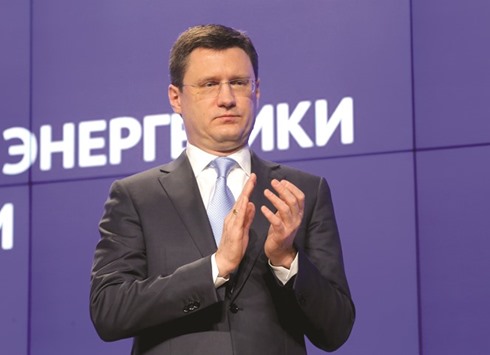Russian Energy Minister Alexander Novak hopes leading oil producers will agree to freeze output at a meeting in Doha on April 17, he said yesterday, which should help the global oil market to rebalance.
Russia, Saudi Arabia, Venezuela and Qatar agreed in February to freeze production at January levels, but said at the time the deal was contingent on other producers joining in.
The April 17 meeting is aimed at cementing that agreement with other Opec and non-Opec producers, which could help reduce an oil glut that has driven oil prices down by around 60% since mid-2014.
The oil market is over supplied by around 1.5mn barrels per day, according to Moscow’s estimates.
“Of course, we hope (for a deal),” Novak told reporters on the sidelines of a conference. “Otherwise we would have not discussed this issue.”
“A freeze at January levels is being discussed, but other proposals could be made,” he added.
An Opec source told Reuters production could be frozen at January, February, March or even first-quarter levels. Russia and the Organisation of Petroleum Exporting Countries were both pumping oil at near record volumes in January.
Russia, the world’s second-largest oil exporter after Saudi Arabia, was pumping at a 30-year high last month of 10.91mn barrels per day (bpd).
Two sources close to the energy ministry told Reuters yesterday production could fall to 10.84 to 10.86mn bpd this month, compared with January levels of 10.88mn bpd.
Russian oil output could be 536 to 540mn tonnes this year, or 10.73 to 10.81mn bpd, Alexei Texler, Russia’s first deputy energy minister, told reporters yesterday. Oil exports could rise by 3.5% this year.
Iran has rejected freezing its output at January levels, which Opec secondary sources have estimated to be 2.93mn barrels per day, and wants to return to much higher pre-sanctions production.
Sanctions imposed on Iran in early 2012 by the US and European Union over its nuclear programme cut crude exports from a peak of 2.5mn bpd before 2011 to just over 1mn bpd in recent years.
Meanwhile, the oil market rebounded sharply this week, with Brent back above $40 per barrel, as hopes grew of an output freeze at the looming producers’ gathering in Doha.
Traders are setting their sights on the April 17 meeting, led by Russia and Saudi Arabia, to discuss measures to stabilise prices – including a production freeze at January 2016 levels.
There have been conflicting signals on whether such an agreement would be reached.
The world’s key producing nations are hoping to tackle a vast supply glut which has sent prices collapsing in recent years. The market had dived last week after Saudi Deputy Crown Prince Mohammed bin Salman said his country would agree to limit output only if fellow producer Iran did the same. However, prices have since pulled higher on supportive Kuwaiti comments and rising global stock markets.
“Oil sold off sharply in the wake of comments by Saudi Arabia stating that there would be no deal without Iran, and then saw a bounce after Kuwait came out and stated that a deal could go ahead without Iran,” said IG analyst Angus Nicholson. Around 1300 GMT yesterday, US benchmark West Texas Intermediate for delivery in May was up $2.10 at $39.36 a barrel compared with Thursday’s close. Brent North Sea crude for June delivery won $1.79 to $41.22 a barrel.
Both contracts were also significantly higher compared with one week earlier.
“Positioning by different sides in the lead up to the meeting is likely to keep the price highly volatile,” added Nicholson.

Russian Energy Minister Alexander Novak applauds during a session of the ministry’s board in Moscow yesterday. Novak said yesterday he expects leading oil producers will agree to freeze output at a meeting in Doha on April 17, which should help the global oil market to rebalance.
